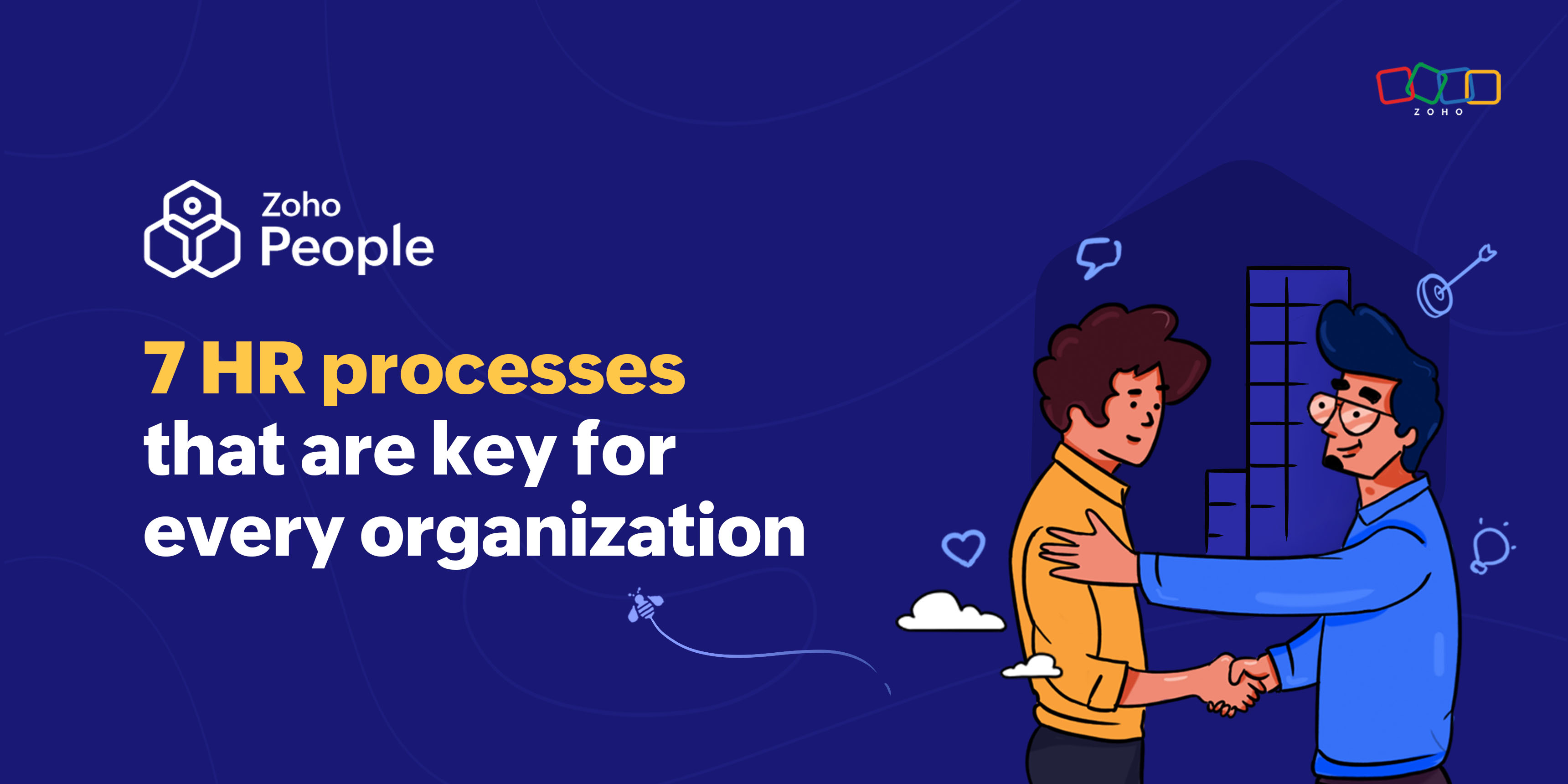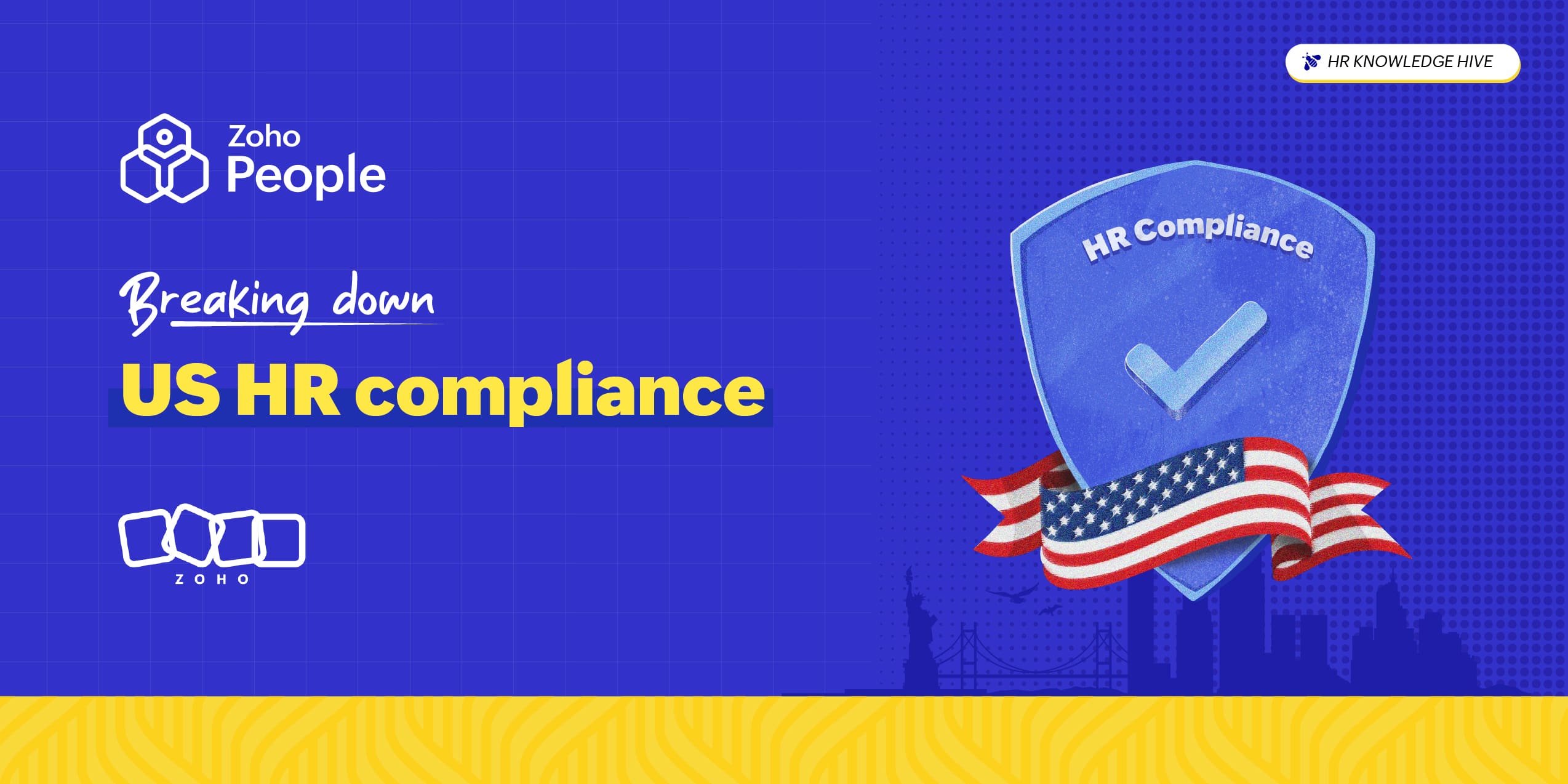- HOME
- HR insights
- HR processes: An overview for businesses looking to get started
HR processes: An overview for businesses looking to get started
- Last Updated : March 25, 2024
- 2.9K Views
- 6 Min Read

Right now, we're in an employee experience era. No matter how big or small your organization is, employees expect to have a smooth experience at every step of their journey. A dedicated HR team can help you establish key HR processes that ensure employees are well-taken care of and managed in accordance with labor laws. If you're looking to establish HR processes at your organization, the following breakdown can help you get started.
What are HR processes?
HR processes are tasks and strategies an organization uses to recruit strong candidates and manage employees effectively. These processes aim to help employees carry out their everyday responsibilities efficiently and excel in their roles. Most HR processes are interdependent and optimized to attract, develop, and retain employees.
Why are HR processes important?
Here are some of the key reasons why every organization should have a set of well-established HR processes:
Bring uniformity to an organization
Well-defined processes, policies, and practices can help your organization manage employees more objectively. For instance, a set of leave policies provides a standard framework for managing different types of employee leave, irrespective of the role, experience, or seniority of the employee applying for it. These HR processes also encourage accountability, as employees know exactly what is expected from them.
Align employees and organizational goals
In most cases, HR processes are administered according to an organization's core values, goals, and needs; that's why HR processes play a key role in aligning employees with the organization's vision. For instance, as part of performance management processes, managers and HR teams set goals for employees that align with overall company objectives.
Ensure compliance
HR teams establish their processes based off national and regional labor laws, and they aim to provide employees with a clear idea of their rights and responsibilities. Since HR audits are an essential part of HR processes, HR teams are always looking to identify areas that are non-compliant and rectify them immediately.
Improve employee experience
HR processes that are tailored to employee needs go a long way towards improving employee experience. For instance, the hiring process is designed to create a good first impression of the organization, and it's often optimized by making the application process smooth with great communication.
What are the different core HR processes?

These are some of the core HR processes that every organization needs to manage their employees in the best possible way:
1. Hiring and onboarding
As part of hiring, HR teams often collaborate with other teams—including development, sales, and marketing—to understand their resource needs. Then, they create detailed job descriptions and advertise them on different channels, including job boards, the company website, social media, and print media. After a number of candidates have applied, the HR teams review the resumes, shortlist them, and schedule interviews. Once the interview process is done and candidates are finalized, they conduct background verification and onboard the new hires. As part of onboarding, HR teams often complete the necessary paperwork, introduce new hires to their company culture, make them aware of their roles and responsibilities, and train them.
2. Employee training and development
Training and development is a key HR process used to identify employee skill gaps and conduct training programs that bridge these gaps. As part of training and development programs, HR teams typically conduct a skill gap analysis, design learning paths, decide on the topics to be included, and take them to employees through their preferred learning methods.
3. Performance management
HR teams often conduct performance appraisals for their employees to offer feedback, help them understand their strengths and weaknesses, keep them aligned with organizational objectives, offer fair promotions and compensation, and set goals for the upcoming performance period. As part of performance appraisals, HR teams conduct self-appraisals and 360-degree feedback to get insights about an employee's performance, enable managers to prepare for performance reviews, rate an employee's performance, offer and solicit feedback, and create development plans.
4. Compensation and benefits
HR teams manage compensation and benefits to attract top talent and keep existing employees satisfied, engaged, and motivated. Compensation includes all the monetary incentives (such as base salary, provident funds, HRA, bonuses, incentives, and overtime pay) offered to employees for the work they do. Benefits include non-monetary incentives (like health insurance, retirement benefits, wellness programs, and educational assistance) to improve employee well-being and morale. Here's everything you need to know about compensation and benefits!
5. Employee relations
Employee relations includes all the activities and processes HR teams have in place to ensure a healthy relationship between management and employees. As part of employee relations, HR teams often develop policies that reinforce employee rights, develop a safe and secure workplace for employees, provide fair wages, prohibit discrimination, treat employees equitably, and properly address any grievances.
6. Workforce planning
HR teams use workforce planning to understand their organizations' future needs and goals based on the market conditions, upcoming trends, and technological advancements. This enables them to guide better hiring decisions. They also make use of these insights to equip their existing employees with the skills to achieve those future goals. HR teams do this to ensure that they have employees who can effectively meet their business needs.
7. Exit management
Exit management involves a set of processes that are performed when an employee leaves their organization. As part of exit management, HR teams often get a formal resignation letter from their departing employees, notify teams about their exit, arrange for knowledge transfer so that work continues uninterrupted, conduct exit interviews, complete paperwork, arrange for their final settlements, and retrieve their company assets.
What are the benefits of automating HR processes?
Since the field of HR involves a variety of processes from recruitment to retirement, managing all of these processes manually can become tiring for HR teams. That's why more and more organizations are using cloud-based HR software solutions to automate their key HR processes. According to an SHRM report, one in four organizations use automation and AI for their HR needs. HR automation comes with a multitude of benefits, including efficiency, cost savings, and accuracy.
For instance, automation can save HR teams from manual processes like filling out employee onboarding forms, creating and updating employee records, tracking attendance and working hours with physical registers, and managing spreadsheets so that they can focus on strategic tasks like workforce planning, succession planning, and employee experience.
With automation replacing the need for human intervention in many cases, HR processes can be error-free. For instance, employees who mark their attendance online automatically document their attendance data in the online system. This same data is then transferred to the payroll system through automation, preventing the introduction of errors from one system to the other.
Further, HR teams (especially those in SMBs) can do more with fewer resources, thus reducing both their budgets and administrative burden. Another great advantage is that automation can help ensure compliance with labor laws, which saves your organization from hefty penalties.
How do well-managed HR processes impact company culture?
HR professionals are often seen as the caretakers of company culture. How they manage daily processes and align them with the organization's core values, mission, and vision make or break the company culture. For instance, during recruitment, the right set of processes must be in place to hire candidates whose values are consistent with that of your organization. Having candidates who culturally align with your organization is the key to managing a positive company culture. Similarly, a well-defined performance management process reviews employee performance regularly and keeps them aligned with the overall goals and objectives. How HR professionals manage conflict resolution, a key aspect of employee relations, can also impact culture. When it's built in a way that encourages employees to convey their points of view openly, it reinforces a culture of transparency and open communication.
Wrapping up
Having a set of well-defined HR processes can truly help your employees unlock their full potential, as it promotes fairness in how employees are treated and upholds a clear company culture. We hope this post helps you establish some of the key HR processes at your organization!
 Tarika
TarikaContent Specialist at Zoho People


